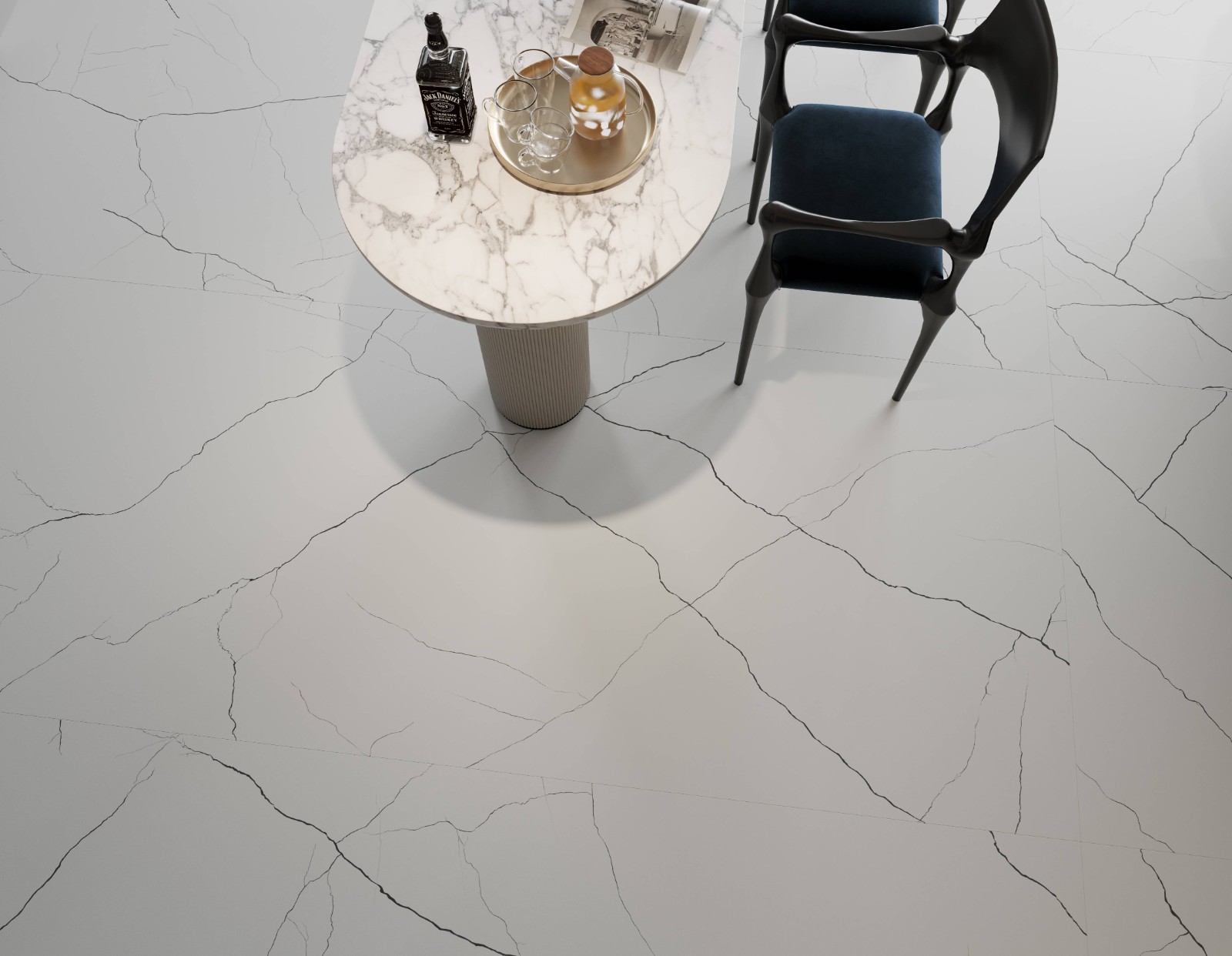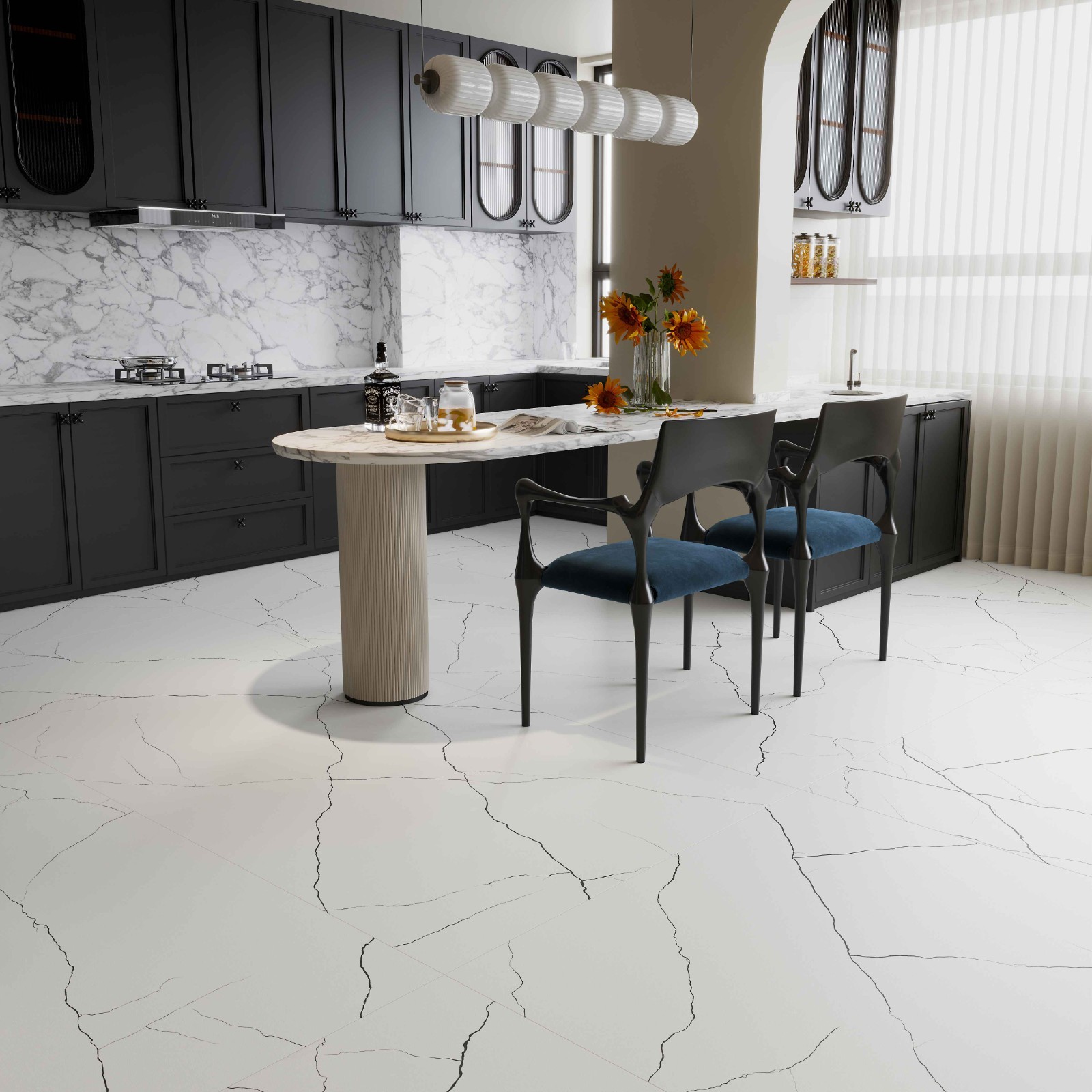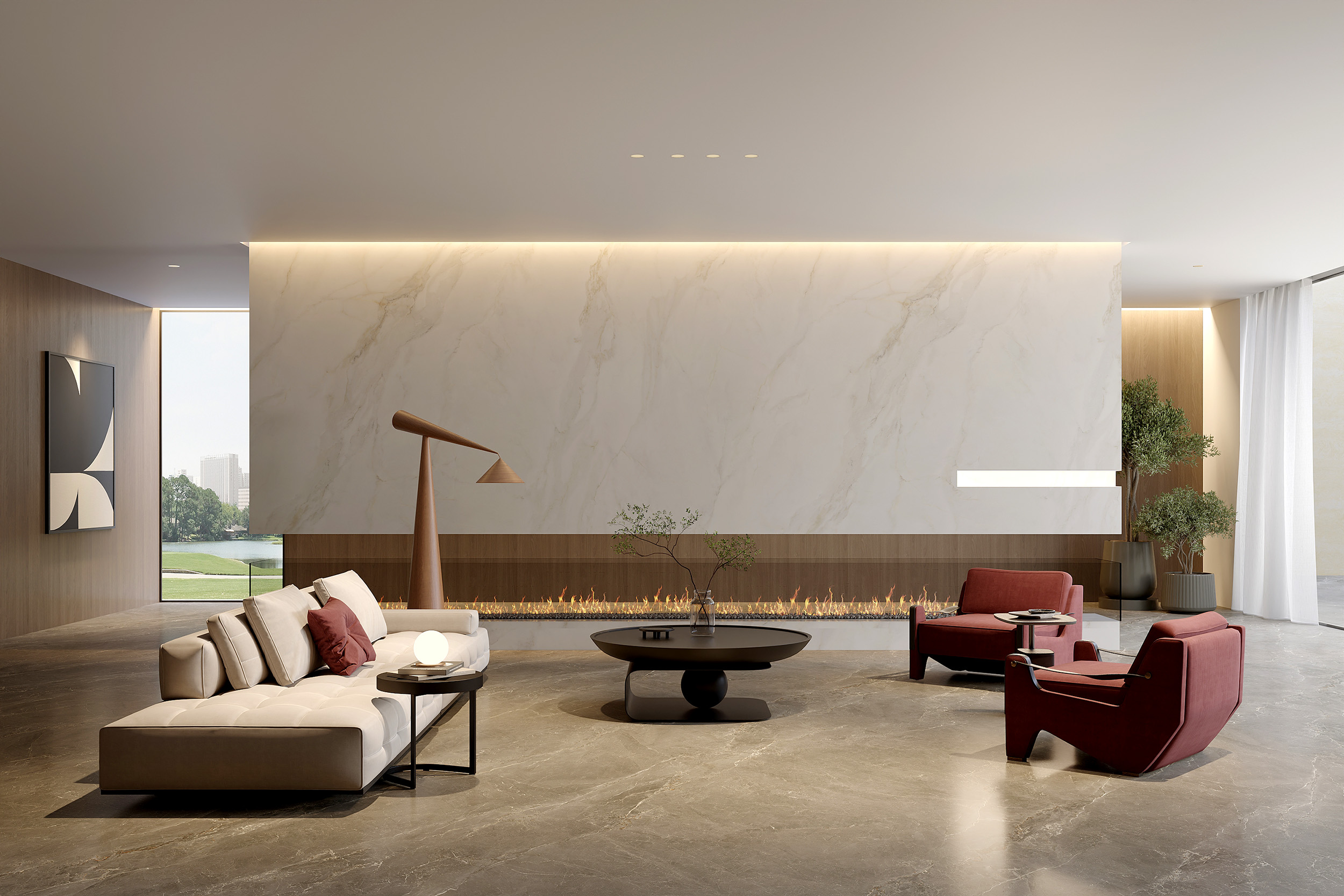In modern home renovations and commercial space design, sintered stone countertops have become a popular choice for kitchens, bathrooms, dining tables, and various countertops. Compared to traditional materials like marble, artificial stone, and quartz, sintered stone countertops have garnered widespread attention for their high hardness, wear and stain resistance, and diverse aesthetics.
However, every building material has its advantages and limitations. Before considering installing sintered stone countertops, many consumers have a core question: What are the advantages and disadvantages of sintered stone countertops?
This article will comprehensively analyze sintered stone countertops from multiple perspectives, including their material properties, advantages, potential disadvantages, and applicable scope, to help readers make more informed decisions when purchasing and using them.

What is a sintered stone countertop?
Sintered stone countertops are a high-performance sheet material made by sintering and pressing natural mineral raw materials at temperatures exceeding 1200°C and under thousands of tons of pressure. It is an ultra-dense material with a uniform internal structure and virtually no micropores, resulting in extremely high stability and durability.
Common characteristics of sintered stone countertops include:
• High hardness—A Mohs hardness of 6-7 provides excellent surface scratch resistance.
• Zero permeability—With near-zero water absorption, it offers exceptional stain and seepage resistance.
• High-temperature resistance—Proof of damage from direct contact with high-temperature cookware.
• Acid and alkali resistance—Resistant to corrosion from most household chemicals.
• Healthy and environmentally friendly—Made from natural materials, it is formaldehyde-free and radiation-free.
Thanks to these properties, sintered stone countertops are increasingly popular for kitchen countertops, bathroom sinks, dining tables, and decorative countertops in commercial spaces.

What are the advantages of sintered stone countertops?
1. High Hardness and Scratch Resistance
One of the greatest advantages of sintered stone countertops is their exceptional hardness. Compared to natural marble or artificial stone, sintered stone countertops offer a more durable surface and are less susceptible to scratches from knives, cutlery, or other hard objects during daily use. This characteristic is particularly important for kitchen countertops.
2. Extremely Low Water Absorption, Stain-Resistant and Penetrating
Sintered stone countertops have a near-zero water absorption rate. Due to their dense internal structure, they absorb virtually no liquids. Therefore, even spills of stain-prone liquids like coffee, red wine, and soy sauce can be easily wiped clean without seeping into the surface.
3. Excellent High-Temperature Resistance
Kitchens often require direct exposure to high-temperature cookware. Traditional stone materials like marble may crack due to thermal expansion and contraction. In contrast, sintered stone countertops can withstand temperatures exceeding 200°C without damage, significantly enhancing their usability.
4. Corrosion and Chemical Resistance
Sintered stone countertops are resistant to most common household acids and bases, such as lemon juice, vinegar, and detergents, and will not easily corrode or discolor. This advantage surpasses many natural stone countertops, ensuring their long-term stability and aesthetics.
5. Environmentally friendly and healthy, free of harmful substances
Sintered stone countertops are made from natural raw materials sintered at high temperatures. They contain no resins or adhesives, and do not release harmful substances like formaldehyde. Their surface is also highly antibacterial, resisting bacterial growth and suitable for direct food contact.
6. Diverse appearances and high design freedom
Sintered stone countertops come in a wide variety of colors, textures, and finishes, simulating the effects of various materials such as marble, wood grain, and metal. They suit both modern minimalist and luxurious decor. Large-format slabs also allow for seamless splicing, enhancing the overall feel of any space.
7. Durable and long-lasting
Thanks to their comprehensive performance, sintered stone countertops are less likely to wear, crack, or fade over time, and their overall lifespan far exceeds that of some traditional countertop materials.

What are the disadvantages of sintered stone countertops?
While sintered stone countertops offer significant advantages, they also have some significant drawbacks.
1. Difficulty in Processing
While the hardness of sintered stone offers excellent performance, it also makes processing more challenging. Cutting, drilling, and edge preparation require specialized equipment and techniques, otherwise chipping or cracking can occur. This means that sintered stone countertops are more expensive to install.
2. High Cost
Due to the complex production process and high requirements for raw materials and equipment, sintered stone countertops are generally more expensive than ordinary artificial stone and some natural stone options. This can be a limiting factor for families on a budget.
3. Heavy Weight
Sintered stone countertops have a high density and are therefore heavier. This not only makes transportation and installation more difficult, but also places higher demands on the load-bearing structure of cabinets or vanity units.
4. Lack of Resilience
Although sintered stone countertops are hard, their internal structure is dense and lacks a certain degree of toughness. If subjected to strong impact during transportation or installation, they may crack or break. Compared to natural granite, they are slightly less impact-resistant.
5. Patterns May Be Too Uniform
Although sintered stone countertops offer a variety of patterns and designs, their texture can sometimes appear too regular or uniform compared to the natural grain of natural stone, lacking the "naturally unique" effect some consumers seek.
Application Scope of Sintered Stone Countertops
Combining its advantages and disadvantages, sintered stone countertops are suitable for the following types of spaces:
• Kitchen countertops – Stain-resistant, scratch-resistant, and heat-resistant, they are an ideal choice for kitchen renovations.
• Bathroom sink countertops – Zero water absorption, ensuring long-term cleanliness.
• Dining and coffee tables – Scratch-resistant and heat-resistant, both beautiful and practical.
• Commercial countertops – A high-end, elegant design suitable for public spaces such as hotels, cafes, and restaurants.
However, when choosing a sintered stone countertop, you need to consider your budget, installation conditions, and usage habits.
How can you leverage the advantages of sintered stone countertops while avoiding their drawbacks?
To fully utilize the advantages of sintered stone countertops and minimize their disadvantages, consider the following:
• Select a professional processing and installation team – Ensure cutting and splicing quality to avoid chipping and cracking.
• Budget appropriately – Include sintered stone countertops in your overall budget planning from the beginning of your renovation to avoid cost overruns.
• Enhance cabinet load-bearing design – Consider the weight of the countertops to ensure structural stability.
• Avoid strong impact – Handle carefully during transportation and installation, and avoid heavy objects from hitting them during daily use.
• Choose the right texture – Choose a sintered stone countertop texture that suits the style of your space to avoid visual monotony.

So, what are the advantages and disadvantages of sintered stone countertops?
• Advantages: High hardness, scratch resistance, stain and penetration resistance, high temperature resistance, corrosion resistance, environmentally friendly and healthy, diverse appearances, and strong durability.
• Disadvantages: Difficulty in processing, high cost, heavy weight, limited impact resistance, and some textures may be too regular.
Sintered stone countertops are a high-performance material that combines aesthetics with practicality, making them particularly suitable for high-use spaces in homes and commercial spaces, such as kitchens and bathrooms.
While price and installation difficulty may be limiting factors, with proper selection and maintenance, sintered stone countertops remain a highly desirable premium countertop material for current renovations.
Can WOWSLAB provide low-price options for bulk marble slab purchases?
Yes. WOWSLAB is a professional manufacturer and supplier in China that specializes in high-quality marble and sintered stone slabs. Buyers can enjoy low prices, discounts, promotional offers, and wholesale purchasing options.
We also support customized orders for unique project requirements. Our professional team ensures comprehensive service, from material selection to installation.


